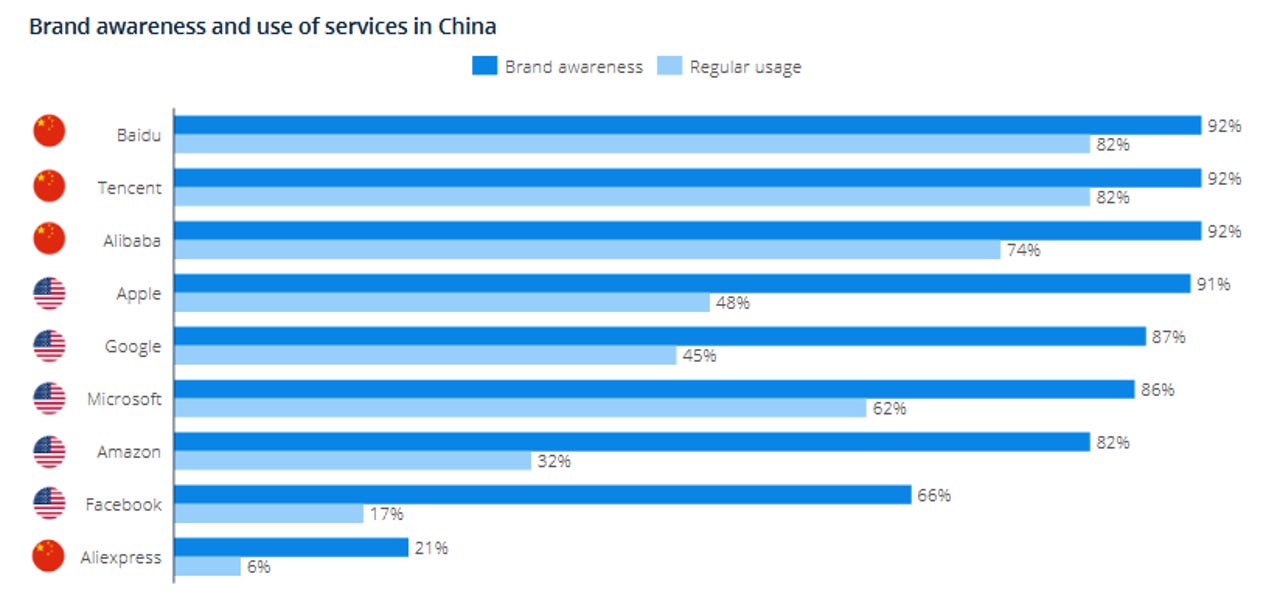Western tech brands are recognized in China, but their products are rarely used

Despite having insignificant market shares and being marginal players in mainland China, western tech giants have a very high brand awareness among Chinese consumers, a market survey published last week revealed.
The survey, which factored in answers from more than 2,000 respondents, showed that for the most part, top western tech companies have established themselves in the consciousness of the Chinese public.
The survey, carried out by market research firm Statista, found that Apple had a 91% brand awareness among Chinese users, one percent behind the brand awareness leaders -- local tech firms Alibaba, Baidu, and Tencent.
However, less than half (48%) of the respondents said they used Apple products, while daily usage for the three top Chinese firms was 74%, 82%, and 82%, respectively.
Similar stats were also recorded for four other western tech giants, with consumers being aware of their business, but rarely using their products -- Google (87% brand awareness, 45% consumer usage), Microsoft (86% and 62%), Amazon (82% and 32%), and Facebook (66% and 17%).

Overall, Microsoft appears to have the most solid userbase in China, with 62% of survey respondents admitting to using the company's many products, such as Windows, Office, OneDrive, and others.
Due to this better market penetration, the Redmond-based OS maker was also the most positively viewed western tech company, with 84% of survey responders seeing the company in a positive light, the second best-reviewed company overall, behind China's Alibaba (89%).
This better market penetration is very obvious when we look at the most popular office suite in China, where 67% of respondents said they used Microsoft Office, followed in a very distant second by WPS Office, with 39%.
On the other hand, other western tech giants appear to have lost the fight for the Chinese consumers' hearts in their respective fields.
For example, on the list of top social media and instant messaging products, Facebook, LinkedIn, and Google ranked 8th, 9th, and 10th, way behind seven Chinese products.
Similarly, iQiyi, the local Chinese YouTube clone, was the most widely used multimedia platform, while YouTube barely ranked on the list.
This is despite the fact that YouTube dominates traffic ranks in every other part of the world, and is the second most accessed website on the internet, according to the Amazon Alexa traffic ranking.
Similar survey results were recorded in the category of most used cloud storage services, where 70% of users said they used Baidu You, while only 15% said they used OneDrive, 10% iCloud, and 4% Dropbox.
On the front of most used digital payment solutions, Chinese companies also dominated, with 87% of survey respondents saying they used Alipay, 76% using WeChat Pay, 25% using QQ Wallet, and 19% using Baidu Wallet.
Here Apple Pay was the only western-based payment service to have recorded above 10%, with 18% of respondents admitting they used the service, while other western payment providers like Amazon Payments, PayPal, Google Pay, Facebook Payments, and Samsung Pay amounting for 10% or less.
The only category where western firms dominated Chinese counterparts was the virtual assistants market, where Siri (36%) beat Google Assistant (21%) and Cortana (12%), but this was because there were almost no home assistant products from local Chinese firms.
Overall, Statista found that Alibaba was viewed as the industry leader on a wide variety of categories, such as customer service, social responsibility, likability, usability, personal data protection, environmental friendliness, and transparency.
The only category where Chinese consumers didn't rate Alibaba first was innovation, where Apple was deemed the top company in the field.